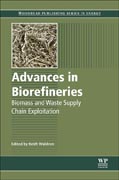
Advances in Biorefineries: Biomass and Waste Supply Chain Exploitation
Waldron, Keith W.
Biorefineries are an essential technology in converting biomass into biofuels or other useful materials. Advances in Biorefineries provides a comprehensive overview of biorefining processing techniques and technologies, and the biofuels and other materials produced. Part one focuses on methods of optimizing the biorefining process and assessing its environmental and economic impact. It also looks at current and developing technologies for producing value-added materials. Part two goes on to explore these materials with a focus on biofuels and other value-added products. It considers the properties, limitations, and practical applications of these products and how they can be used to meet the increasing demand for renewable and sustainable fuels as an alternative to fossil fuels. Advances in Biorefineries is a vital reference for biorefinery/process engineers, industrial biochemists/chemists, biomass/waste scientists and researchers and academics in the field. A comprehensive and systematic reference on the advanced biomass recovery and conversion processes used in biorefineriesReviews developments in biorefining processesDiscusses the wide range of value-added products from biorefineries, from biofuel to biolubricants and bioadhesives INDICE: Foreword Preface Part I Development and optimisation of biorefining processes Chapter 1 Green chemistry, biorefineries and second generation strategies for re-use of waste: an overview L. A. Pfaltzgraff and J. H. Clark, University of York, UK Chapter 2 Techno-economic assessment (TEA) of advanced biochemical and thermochemical biorefineries T. R. Brown, Iowa State University, USA, M. M. Wright and Y. Román-Leshkov, Massachusetts Institute of Technology, USA and R. C. Brown, Iowa State University, USA Chapter 3 Environmental and sustainability assessment of biorefineries L. Schebek and Othman Mrani, Technische Universität Darmstadt, Germany Chapter 4 Biorefinery plant design, engineering and process optimisation J. B. Holm-Nielsen and E.A. Ehimen, Aalborg university, Denmark Chapter 5 Current and emerging separation technologies in biorefining S. Datta, Y. J. Lin and S. W. Snyder, Argonne National Laboratory, USA Chapter 6 Catalytic processes and catalyst development in biorefining S. Morales-dela Rosa and J. M. Campos-Martin, Instituto de Catálisis y Petroleoquímica, CSIC, Spain Chapter 7 Enzymatic processes and enzyme development in biorefining S. A. Teter, K. Brandon Sutton and B. Emme, Novozymes, USA Chapter 8 Biomass pretreatment for consolidated bioprocessing (CBP) D. Levin, V. Agbor, C. Carere, N. Cicek and R. Sparling, University of Manitoba, Canada Chapter 9 Developments in bioethanol fuel-focussed biorefineries S. Mutturi, B. Palmqvist, and G. Lidén, Lund University, Sweden Chapter 10 Developments in cereal-based biorefineries A. A. Koutinas, Agricultural University of Athens, Greece, C. Du, University of Nottingham, UK, C. S. K. Lin, City University of Hong Kong, Hong Kong and C. Webb, University of Manchester, UK Chapter 11 Developments in grass/forage-based biorefineries J. McEniry and P. O'Kiely, Teagasc (Irish Agriculture and Food Development Authority), Ireland Chapter 12 Developments in glycerol byproduct-based biorefineries B. P. Pinto and C. J. de Araujo Mota, Universidade Federal do Rio de Janeiro, Brazil Part II Biofuels and other added value products from biorefineries Chapter 13 Improving the use of liquid biofuels in internal combustion engines R. J. Pearson and J. W. G. Turner, University of Bath, UK Chapter 14 Biodiesel and renewable diesel production methods J. H. Van Gerpen and B. B. He, University of Idaho, USA Chapter 15 Biogas and biohydrogen production via anaerobic digestion/fermentation K. Stamatelatou, Democritus University of Thrace, Greece and G. Antonopoulou, Institute of Chemical Engineering Sciences, Greece Chapter 16 The production and application of biochar in soils S. Joseph, University of New South Wales, Australia and P. Taylor, Biochar Solutions, Australia Chapter 17 Development, properties and applications of high-performance biolubricants D. R. Kodali, University of Minnesota, USA Chapter 18 Bio-based nutraceuticals from biorefining Y. Liang and Z. Wen, Iowa State University, USA Chapter 19 Bio-based chemicals from biorefining: carbohydrate conversion and utilisation K. Wilson, European Bioenergy Research Institute, Aston University, UK and A. F. Lee, University of Warwick, UK and Monash University, Australia Chapter 20 Bio-based chemicals from biorefining: lignin conversion and utilisation A. L. Macfarlane, M. Mai and J. F. Kadla, University of British Columbia, Canada Chapter 21 Bio-based chemicals from biorefining: lipid and wax conversion and utilisation Y. Yang and B. Hu, University of Minnesota, USA Chapter 22 Bio-based chemicals from biorefining: protein conversion and utilisation E. L. Scott, M. E. Bruins and J. P.M. Sanders, Wageningen University, The Netherlands Chapter 23 Types, processing and properties of bioadhesives for wood and fibres A. Pizzi, University of Lorraine, France Chapter 24 Types, properties and processing of bio-based animal feed E. J. Burton and D. V. Scholey, Nottingham Trent University, UK and P. E. V. Williams, AB Vista, UK Chapter 25 The use of biomass to produce bio-based composites and building materials R. M. Rowell, University of Wisconsin, USA Chapter 26 The use of biomass for packaging films and coatings H. M. C. de Azeredo, Institute of Food Research, UK, M. F. Rosa and M. de Sá M. Souza Filho, Embrapa Tropical Agroindustry, Brazil and K. W. Waldron, Institute of Food Research, UK
- ISBN: 978-0-85709-521-3
- Editorial: Woodhead Publishing
- Encuadernacion: Cartoné
- Páginas: 864
- Fecha Publicación: 21/04/2014
- Nº Volúmenes: 1
- Idioma: Inglés
